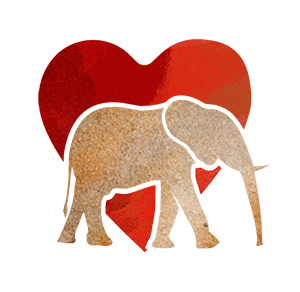We hurriedly packed our Pickup Truck with the rescue paraphernalia which included rehydration salts, water, milk, ropes etc, and accompanied by a group of Keepers, we headed to the place, a journey that took us l hour and 20 minutes. There we found the Salt Lick Lodge personnel busy digging an exit hole through the side of the concrete tank.
Peeping from the top of the tank, we could just see the tip of a floating trunk and a small portion of the calf’s back. The rest of the body was submerged. The tank was about 20 ft long x 12 ft. wide and l0 ft. deep, with the water resting at 7 ft. This meant that the calf could not touch the bottom, nor reach the top, so in order to remain alive, it had to keep swimming with nothing to hold on to, unable to rest. (It had obviously been like this for many hours, likely to have fallen in sometime during the night).
It was difficult for us to judge the age of the calf, the only clue being the small size of the manhole through which it had fallen, implying that it must be small. Once the side of the concrete tank had been breached, we could reach the exhausted calf who was very fatigued but who was able to hold onto a hand or the rope we offered. This made our work easier, and after some difficulty, we were able to secure the rope around its girth, and with the help of the Lodge personnel, managed to haul it out. We could now see that the calf was about 9 months of age, and a bull, but once it was free, the lodge personnel took to their heels, expecting trouble! However, it was so weak that it put up little resistance, and we were easily able to restrain it. Within 3 minutes he readily accepted a bottle of milk and with the help of the lodge personnel, who returned once they could see that the calf was not aggressive, we managed to load him into the back of the pickup truck and drive the 10 kms. to the nearest Airfield, having alerted the Trust HQ in Nairobi National Park to the fact that an aircraft was needed to take the calf to the Nairobi Nursery”.
There were two choices for a name – “Chumvi” (the Swahili word for salt, but which is rather too similar to our “Chuma”, or “Taita”. Whilst we in Nairobi awaited the arrival of the calf, we and the Keepers decided on “Taita”. The little bull was not tranquilized for the flight, but lay with legs loosely tied on a mattress. However, by the time he arrived in Nairobi, he had recovered his strength, and was extremely aggressive, charging everyone that came in sight, although he took milk and rehydration readily when offered. Because it was difficult to try and calm him in the confined space of a stable, and bearing in mind that elephants suffer from claustrophia in small confined places, the next morning we decided to try and move him into one of the larger Rhino Stockades where there was more room for the Keepers to manoeuvre and take evasive action when needed! In order to do this, he needed some sedation to make him drowsy enough to be able to push along without fear of him breaking loose, and once safely inside the Stockade formerly occupied by Morani, he slept for several hours, which was much needed rest after such a grueling and traumatic time. For the next two days, with gentle talking and two Keepers with him, offering him greens and milk, he gradually became less aggressive and tense, and enjoyed being introduced to the other six Nursery inmates through the bars of the Entrance Gate. As always, this worked like magic, and on the third morning, little “Taita” was allowed out to join the other Nursery babies, going off happily as a mini herd into the Nairobi Park forest with their Keepers.
![]()
Having had the example of Seraa, who, like this calf, was almost drowned before rescue, we anticipated problems such as pneumonia, plus of course, stomach disorders due to the unhygienic conditions to which he has been subjected. Elephants cannot cough, so the only indication of lung problems is a wet trunk, but watched for this and anticipated difficulties ahead. Little Taita certainly had spirit however, and the determination to make it. With a great deal of diligence and above all, tender loving care and the input of the other Nursery inmates, Tiata pulled through and regained all of his strength and energy.
Taita did extremely well at the Nursery and was one of the first orphans to move to the new Ithumba Unit in 2004. We still have the fortune of seeing this grand bull from time to time, as he is sometimes spotted by the Keepers on his own, with Yatta and Wendi's herd, or sometimes with ex-orphan bull Tomboi as well.
















